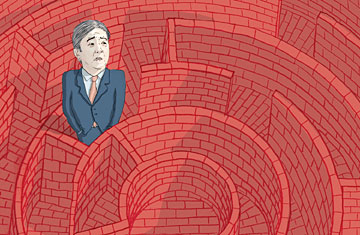
So why, in the midst of all this rich success, did 67.6% of Japanese respond to a recent Cabinet Office survey by saying that they felt anxious about their daily lives—the highest angst level recorded since the poll began nearly 40 years ago? Perhaps because they're looking beyond the next club opening or quarterly report, toward a national future that is anything but certain. Despite the country's economic recovery, Japan is still pinned beneath $6.9 trillion in public debt, and that's 1.5 times the nation's GDP, the worst ratio in the industrialized world. A widening gap between rich and poor is threatening to shatter Japan's view of itself as a predominantly middle-class country. The boom in the big cities has yet to be felt in the nation's heartland. China's rise is challenging Japan's economic predominance, with China already spending more than its rival on defense and R&D, for example. And Japan's population is graying fast, leaving working-age Japanese to wonder how they'll support a growing number of elderly—and just who will support them when it's their own turn to retire. "Tokyo is doing well, but outside Tokyo is not," says Mizuho Fukushima, leader of the opposition Social Democratic Party (SDP). "The nation is doing well, but its citizens are not."
Meanwhile, in his first four months in office, Prime Minister Shinzo Abe has seemed out of touch with the national mood. While Japanese say they're most worried about stagnant wages, a fragile pension system and growing social disparities, Abe has chosen to prioritize plans to revise Japan's pacifist constitution. While parents fret about declining academic standards, Abe's response has been to pass a reform bill that will attempt to make children more patriotic, and may bring back physical punishment to schools. "I'm not sure that constitutional revision should be the No. 1 issue," says Sadakazu Tanigaki, a former Finance Minister who ran against Abe in September's Liberal Democratic Party (LDP) presidential election. "There are so many issues that people are more concerned about, like social security or the low birthrate." LDP Diet member Taro Kono is blunter: "Constitutional amendments? Who cares?"
Abe has already paid a political price for falling out of step with voters. His approval ratings fell to 40% in an early February poll, down from nearly 70% when he took office in September, and for the first time more people disapproved of him than approved. After early diplomatic successes in China and South Korea, scandals and controversies have entangled several top administration officials. There's growing doubt about his passion for carrying out economic and political reforms initiated by his predecessor Junichiro Koizumi, and his own advisers privately admit that the Prime Minister—who often seems scripted and ill at ease in public—is suffering in comparison to the remarkably mediagenic Koizumi. It doesn't help that Abe's young and inexperienced team lacks influence within its own party. With the LDP and its ruling coalition partner the New Komeito Party in danger of losing control of the upper house of the Diet in July elections, the Oriental Economist Report, a newsletter, recently wondered if Japan was already "on the verge of the 'post-Abe' era."
In reality, Abe is unlikely to fall so quickly. The LDP holds an unassailable majority in the Diet's lower house, and approval ratings for the main opposition Democratic Party of Japan (DPJ) are even worse than the Prime Minister's. Abe's supporters also argue that he remains relatively popular by the lackluster historical standards of most Japanese leaders, and that he hasn't received enough credit for repairing Japan's often fractious relations with its Asian neighbors. Shoichi Nakagawa, the LDP's powerful policy chief, asserts that the Abe Cabinet takes everyday issues just as seriously as it does ideological ones. "We can do constitutional reform and the economy as well," says Nakagawa. "We aren't ignoring daily matters." But Abe's critics say he's failing to prioritize and lacks the ability to articulate a vision that addresses the issues troubling ordinary Japanese. Instead, Abe seems mired in the past, calling for a return to traditional values, to Japan "the beautiful country," his favorite figure of political speech. "Abe seems to be a modern politician, but he actually has a nostalgic 1950s vision of Japan that doesn't comport with reality today," says Michael Zielenziger, author of the book Shutting Out the Sun: How Japan Created Its Own Lost Generation. Adds Carol Gluck, a professor at Columbia University's Weatherhead East Asian Institute: "His rhetoric plays as a reassurance that things are not going to fall apart. But most people do not agree with him."
